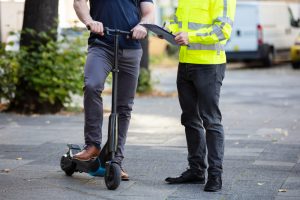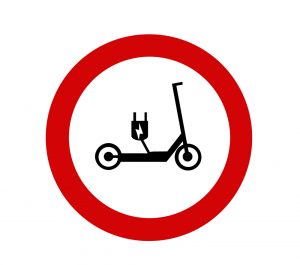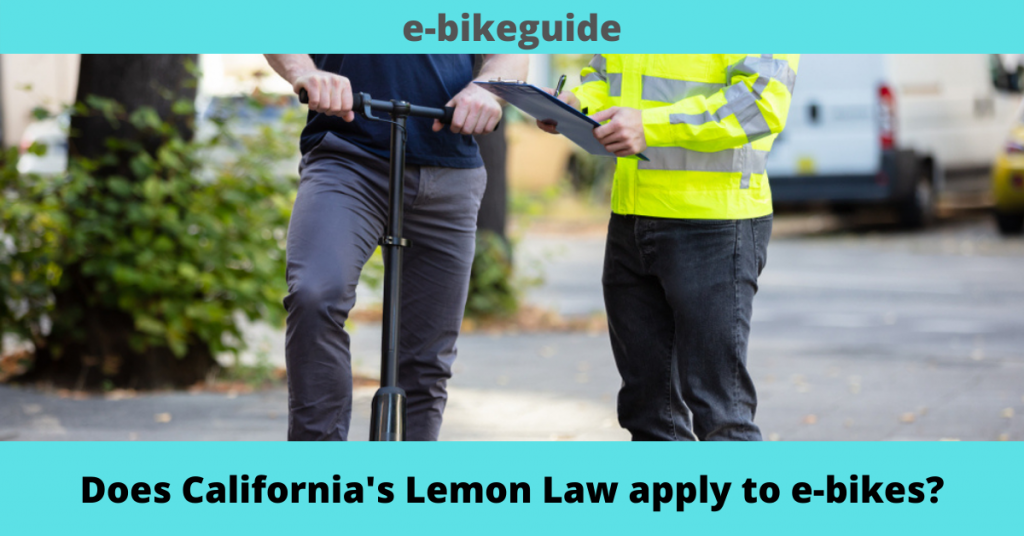
Riding an e-bike gives you a sense of independence that you don’t get from any other mode of transportation. It also makes you feel good about the fact that you aren’t contributing to air pollution since e-bikes don’t burn fuels. Moreover, you have the opportunity to upgrade your e-bike to get the promise of increased speed, ease of handling, reliability, and safety. But when your new e-bike fails to deliver on its promises, it’s a huge letdown. Imagine your e-bike starts falling apart after a couple of rides. Was it because you handled it too roughly or was it a faulty bike in the first place? Whose fault is it, and what can you do about it? Well, there are laws that can handle the situation but you need to have a clear idea about which laws are applicable to your ride. For instance, despite the fact that e-bikes have a motor, the Vehicle Code does not classify them as a “motor vehicle.” So laws that apply to motor vehicles may not be relevant for e-bikes. The article will be discussing the Lemon Law, whether it applies to e-bikes, and if not, what other options are available instead.
What Is The California Lemon Law?

The Lemon laws exist to safeguard consumers who purchase consumer products for daily use. The California lemon law, in particular, protects consumers who buy motor vehicles for personal, family, or home use. These laws ensure that automakers follow through on their warranty promises. One of their most important promises is that the vehicles they sell would provide safe and dependable mobility. The lemon law also requires the auto manufacturer to fix any problems that arise during the warranty period.
There have been cases of many automakers selling thousands of damaged automobiles every year and failing to address the flaws throughout the warranty term. In order to address this issue, the California Lemon Law mandates automakers or licensed repair shops to correct vehicle defects within a reasonable amount of time. Moreover, the California Lemon Law stipulates that if an automaker sells you a defective car, truck, or another motor vehicle, the carmaker must either replace it or refund your money.
Lemon Law And E-Bikes

The number of e-bike riders is rising by the day in the US. E-bike enthusiasts are also leveraging DIY kits and other mechanisms to maximize the power and speeds of e-bikes. Matters took a serious turn in France after a series of e-bike accidents were reported. It’s important that you are aware of the laws that are present in relation to e-bikes and riders.
Finding if Lemon law applies to your e-bikes can be tricky. First and foremost, you must determine whether or not your bicycle qualifies as an “electric bike” as defined by the state. It must be noted that having two wheels and being driven by electricity does not make something an e-bike. Similar machines are categorized as electric motorized vehicles under state and federal legislation and are subject to far more inspection and regulation.
So what exactly is an e-bike? The only difference between an e-bike and a regular bicycle is that the e-bike has an electric motor. In California, an electric motor must have a power output of 1,000 watts or less, and be incapable of pushing the bike faster than 20 miles per hour to qualify as an e-bike rather than a motorized vehicle. That seems pretty straightforward, doesn’t it? Not so quickly! This speed categorization only refers to the motor’s capacity to push the bike faster than 20 mph, not the bike’s ability to travel faster than 20 mph (from pedaling or downhill momentum). Essentially, an e-bike cannot move faster than 20 miles per hour using only the motor, but it can go faster than 20 miles per hour if the rider physically pedals the e-bike like a regular bicycle or jams down a hill over 20 mph. There are other classifications of electric bikes (lawfully defined), but this basic definition distinguishes e-bikes from electrically powered motor vehicles and provides a broad overview of what an electric bike is.
According to Jean C, a lawyer in California, Lemon laws do not apply to e-bikes, but they do apply to all other products under the Uniform Commercial Code or UCC. There’s a regulation known as the perfect tender rule. That is to say, goods sold as new are expected to be in flawless condition and free of issues. If they are offered secondhand or in any manner used, the vendor must inform the buyer of any known flaws. As a result, you would be entitled to a refund on the bicycle or reimbursement for the cost of repairs.
What Laws And Safety Protocols Are Applied To E-Bikes?

As discussed above, the perfect tender rule applies to e-bikes which work as an alternative to the Lemon Law.
Moreover, e-bikes are subject to a number of California laws, as well as some federal requirements, as legally defined vehicles. With a few exceptions, an e-bike in California is treated essentially the same as a traditional bicycle. E-bikes must be operated similarly to traditional bicycles and are not classified as motor vehicles under the Vehicle Code. As a result, e-bikes are exempt from a number of laws and regulations that apply to motorcycles and automobiles in California. For example, operator’s licenses, state or local registration, motor vehicle insurance, and license plates, for example, are not required or used by e-bike operators. None of these standards, which are all fairly common to car drivers, apply.
As previously stated, e-bikes are not permissible in Lemon Law, and insurance is not required to ride an e-bike legally. Your existing policy, on the other hand, may cover an accident involving your e-bike. Incidents involving electric bikes are rarely covered by standard plans, although personal injury accidents are. Even if you don’t have e-bike insurance, you can receive cash compensation if you’re involved in an accident. You should contact your insurance company or agent to see if particular electric bike coverage is given or offered. You also have a few alternatives if you want to protect your e-bike against theft. For instance, you may purchase bike insurance coverage that will cover the cost of replacing an e-bike if it is stolen. Such plans are beneficial, but they can be difficult to come by and can be costly.
Of course, if you have an accident while riding your e-bike or discover any defects after purchasing it, contact an expert bicycle accident attorney in California to discuss your case. While many of the same factors that define regular bicycle accidents apply in e-bike accidents, there may be unique issues that complicate the rehabilitation process.
Get Help from California Lemon Law Attorneys

If your e-bike has one or more recurring problems that you haven’t been able to fix after a reasonable amount of attempts, it’s high time you get legal advice. Most people are unaware of the laws that can help them out in such situations. But if you dive into it you will see that there are options for settling your e-engine bike’s troubles, malfunctioning transmissions, brake problems, and other nonconformities that might render an e-bike unreliable or dangerous. Jean C, a lawyer in California further claims that whether it is a company’s failure, a developer’s fault, or a seller’s mistake, they are responsible to replace it or pay you to fix it because he is in the chain of cells. He can then sue the manufacturer or even the designer if he believes they sold him faulty goods. Furthermore, you can demand any amount of money you want back, whether it’s a refund or the cost of repair, and if he refuses or ignores your calls, the next step is to take him to small claims court, which can be done without an attorney by filling out the small claims court form on the website of your local civil courts.
Conclusion

Having an e-bike is a fun experience, but it can be soiled if you’ve been tricked into purchasing a flawed bike or if your e-bike starts acting out and your automaker does not comply with your warranty claims. The Lemon law assures that consumers are not duped by automakers to purchase faulty products and makes sure that the consumers receive proper compensation in case of malfunctions during the period of warranty. However, the California Lemon Law does not apply to e-bikes. This is because they do not meet the requirements stated by law to classify as a motorized vehicle.
Since they aren’t classified as motor vehicles, they will be exempt from requirements such as licensing, insurance, and so on. Nonetheless, there are several other general laws that apply to e-bikes like ones related to insurance policies, compensations, and more.
If you are an e-bike owner or planning to purchase one, it will be in your best interest to be aware of these laws so that you don’t find yourself in a compromised position with a faulty e-bike.
